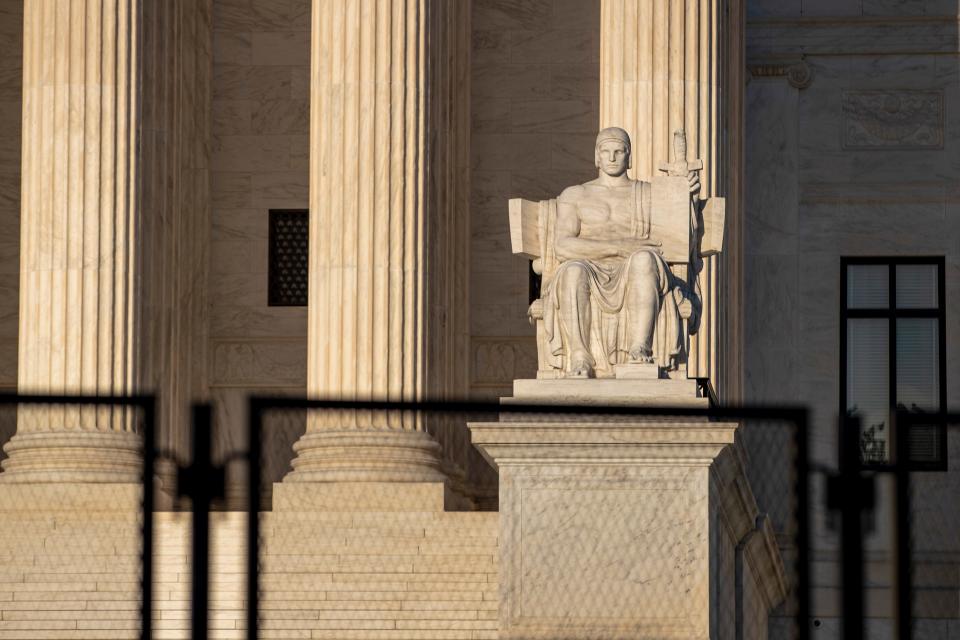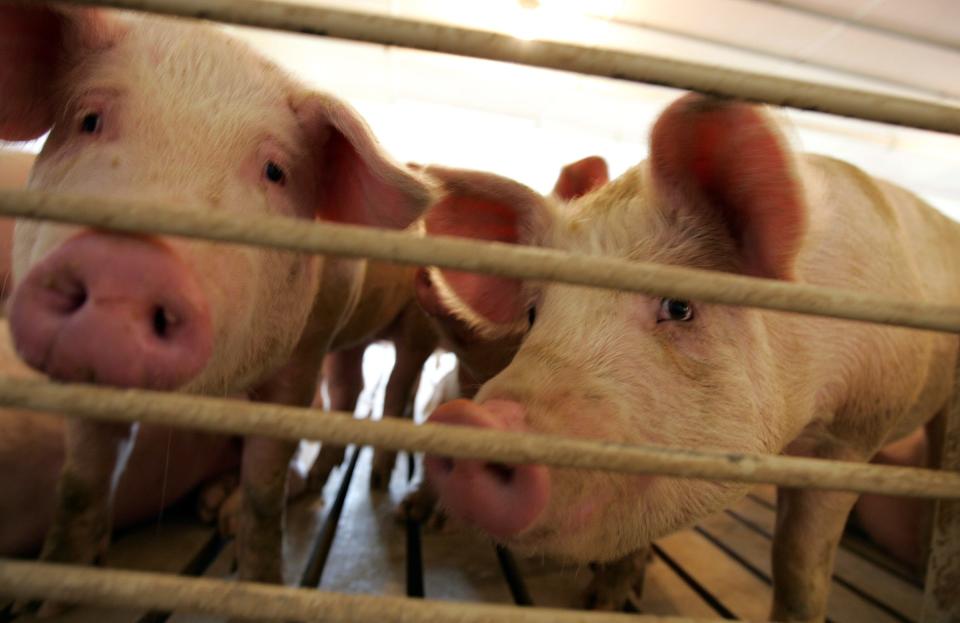How a Supreme Court case about pig farms could muddy looming debate over out-of-state abortions
WASHINGTON – When the Supreme Court agreed this year to settle a dispute between California and a group of Midwestern pig farmers, the connection to the nation's raging cultural battle over abortion wasn't even part of the discussion.
California's law, after all, is aimed at animal cruelty and intended to ensure pigs have space to move around in their pens. Abortion wasn't raised by either side.
But a number of legal experts believe the case could have implications for a thorny question likely to crop up if the nation’s highest court overturns Roe v. Wade later this year: Whether lawmakers in one state may prohibit people from traveling to another state to obtain an abortion.
Missouri is already eyeing a law that would discourage residents from crossing into neighboring Illinois or other states for the procedure. Other conservative states will almost certainly follow Missouri's lead, a range of experts predict, if the Supreme Court strikes down its landmark 1973 decision establishing a constitutional right to abortion.
Related video: Roe v. Wade leaked draft opinion on abortion sparks protests
Precedent: The Supreme Court has overruled itself on segregation and saluting the flag. Will Roe be next?
Whodunit?: Speculation swirls as Supreme Court launches probe into leaked draft abortion opinion
Right to privacy fallout: Could rights to same-sex marriage, contraception be next?
A draft opinion in a major abortion case that leaked this month suggests that the 6-3 conservative court is revisiting Roe and a subsequent abortion ruling from 1992. If the high court overrules those precedents, it would shift the abortion battle to states and create a patchwork of laws that will vary depending on which party controls the state legislature.
"The endgame is not just to ban abortion in your state but to ban it everywhere," said Rachel Rebouché, interim dean of the Beasley School of Law at Temple University. "One way states may try to do that is to try to have their laws reach out beyond their borders."

Whether a state can ban residents from obtaining an abortion in another state implicates a complicated legal doctrine known as the dormant commerce clause, which generally bars states from passing laws that discriminate against or excessively burden interstate commerce – including when Congress hasn’t weighed in to clarify the rules. In other words, if Congress has not acted by passing a law affecting interstate commerce, the assumption under the doctrine is that Congress intends an open market without state-imposed regulation.
The decision in the California case could also play into efforts to restrict medication abortions, which accounted for 54% of all abortions in 2020, according to the Guttmacher Institute, a research group that supports abortion rights. A drug company filed a lawsuit in 2020 asserting that Mississippi's prohibition on abortion medication violates the dormant commerce clause. That case is pending.
The Supreme Court will hear arguments this fall over whether California violated the so-called dormant commerce clause when voters approved a ballot measure in 2018 making it a crime to sell pork in the state unless the pig was born to a sow housed with 24 square feet of space. Because the Golden State imports most of its pork, that condition affects mainly farmers in states like Iowa, Minnesota, North Carolina and Illinois.
In their suit, the National Pork Producers Council and American Farm Bureau Federation said California’s law would require "massive and costly alteration to existing" pig housing. California counters it should be able to set policies for its residents and that farmers may choose to sell their bacon and pork chops to other states if they want to keep pigs in smaller pens.

How much impact the Supreme Court’s decision could have on out-of-state abortion prohibitions will depend on how far the justices wade into the broader debate about the dormant commerce clause, a concept that dates back to some of the high court’s rulings from the early 19th Century under Chief Justice John Marshall.
The issue has occasionally split the Supreme Court’s current conservative bloc. Associate Justices Clarence Thomas and Neil Gorsuch have questioned whether the framers intended to place such restrictions on states. "Unlike most constitutional rights, the dormant commerce clause doctrine cannot be found in the text of any constitutional provision but is (at best) an implication from one," Gorsuch wrote in 2019.
But Associate Justice Samuel Alito defended the doctrine in a 2019 decision striking down a Tennessee law that banned liquor sales by out-of-state residents.
"Without the dormant commerce clause, we would be left with a constitutional scheme that those who framed and ratified the Constitution would surely find surprising," Alito wrote for a 7-2 majority that included liberals and conservatives. "Removing state trade barriers was a principal reason for the adoption of the Constitution."
The issue has divided lower courts as well. In the lawsuit over California's law, the U.S. Court of Appeals for the 9th Circuit dismissed the farmers’ lawsuit last year, writing that while the dormant commerce clause "is not yet a dead letter, it is moving in that direction."
Experts say there’s a good chance the Supreme Court agreed to hear the appeal to speak to that assertion. That could mean clarifying the circumstances under which a state may pass a law regulating commerce outside its borders. Or it could mean something more: That a majority of the court wants to offer a full-throated defense of the dormant commerce clause doctrine.
“As far as its impact on the ability of states to regulate out-of-state abortions, it, of course, would depend on what the court says,” said Brannon Denning, a professor at the Cumberland School of Law at Samford University. “If it reverses the Ninth Circuit and endorses a broad principle, then that would certainly strengthen the hand of anyone challenging such laws.”
But even if the high court goes in the other direction, giving states more power to pass such laws, it wouldn’t mean that "anything goes," Denning said. That’s because the Supreme Court has long recognized other rights, including the ability to travel between states.
Missouri is attempting to curtail out-of-state abortions before the Supreme Court rules on Mississippi's prohibition on most abortions after 15 weeks of pregnancy. Anti-abortion advocates hope the court will use the blockbuster case to overrule Roe.
A draft opinion written by Alito, leaked to Politico and later confirmed by the Supreme Court as authentic indicated that at least some of the court’s conservatives are moving in that direction. Experts predict proposals similar to Missouri’s are likely to pop up if the high court’s final opinion looks anything like Alito’s draft. Citing unnamed sources, Politico reported Wednesday that the draft has support from a majority of justices.
Chelsey Youman, the Texas state director for the anti-abortion group Human Coalition Action who also advises the group on national policy, said she's working with lawmakers in Texas on an out-of-state ban – potentially one that could be similar to Missouri’s. That effort is preliminary, she said, in part because the Texas legislature won't meet again until next year.
"Texas legislators and leadership are really dedicated to protecting human life in the womb, no matter where those human lives are," Youman said.
Future state legislation could include criminal penalties. But Youman said she believes states could also craft out-of-state abortion bans that allow private citizens to sue over the issue, just as Texas imposed with a high-profile ban on most abortions after six weeks of pregnancy. That arrangement might avoid the kind of interstate issues involved in the California case.
A spokesperson with the California Department of Justice who declined to be identified said the office is unable to speculate about potential implications, particularly given the early stage of the case.
"The law is very underdeveloped in this area," said David Cohen, a professor at the Thomas R. Kline School of Law at Drexel University, who stressed he was speaking generally about the issue of interstate business regulations and not the California case.
"To the extent that the court discusses the power of one state to enact laws that have extraterritorial effects, it could have relevance to this issue of abortion and whether states could pass laws that go beyond their borders," he said.
This article originally appeared on USA TODAY: Supreme Court case about pig pens may sway looming abortion battle

